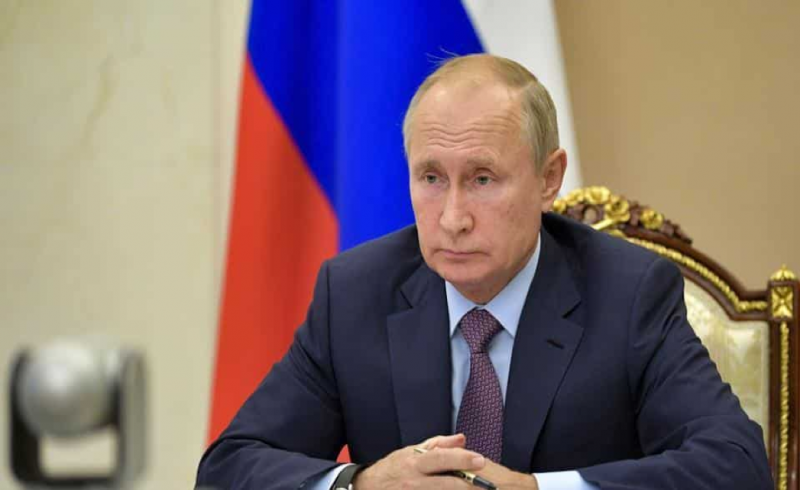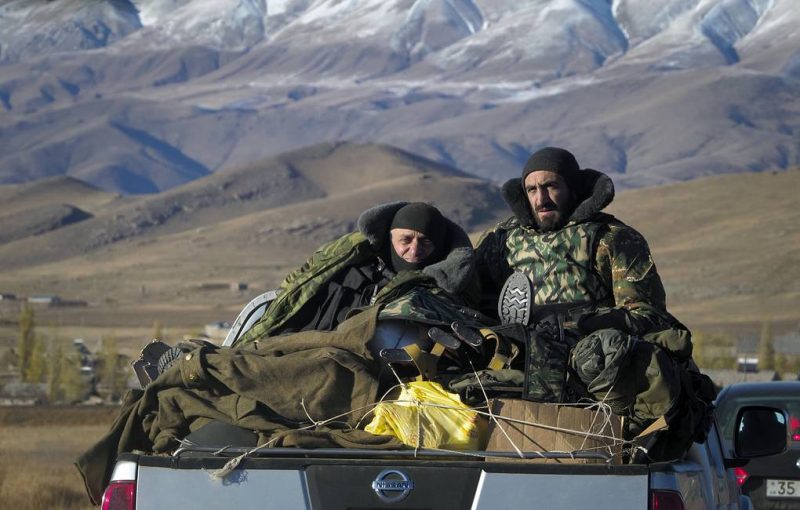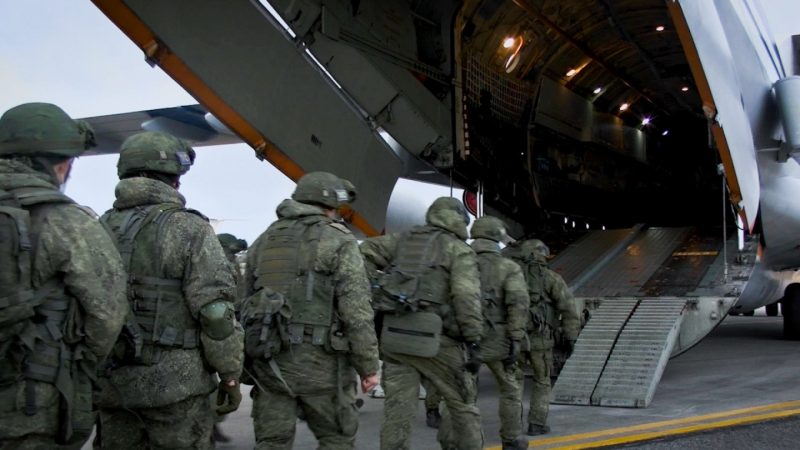
The trilateral Russia-Armenia-Azerbaijan statement of November 10 on Nagorno-Karabakh is a very major development in regional and international security. It is very seldom that a quintessentially ethnic conflict with political and strategic overtones is tamped down by a redrawing of territorial boundaries.
The agreement bears every bit the imprimatur of President Vladimir Putin. Putin’s separate statement virtually affirms it too. Broadly, under the deal, Azerbaijan will hold on to areas of Nagorno-Karabakh that it has taken during the conflict.
Armenia has also agreed to withdraw from several other adjacent areas over the next few weeks. Nagorno-Karabakh stands truncated. Russian peacekeepers have taken charge of the contact lines and communication arteries. The deal can only be read as a victory for Azerbaijan and a defeat for Armenia.
Importantly, it constitutes a diplomatic masterstroke for the Kremlin. Russia positions itself in the centerstage of Transcaucasian politics, with perfect timing.
A defining moment came on November 9 when Azerbaijan gained military control over the strategically important hilltop town known as Shusha, a natural fortress perched in the mountains and bordered by sheer cliffs, at a commanding height overlooking several mountain valleys and Nagorno-Karabakh’s capital, Stepanakert (just 10 kms away), and considered a linchpin to military control of the region.
The town’s capture effectively meant that Azerbaijan had overrun a main road (called the Lachin Corridor) connecting Armenia and Nagorno-Karabakh. Lachin Corridor was critical for Armenia to send military supplies along switchbacks over a mountain pass.

Simply put, the jingoistic Armenian leadership of Prime Minister Nikol Pashinyan stared at the stunning politico-military reality that the fall of Stepanakert was imminent and the judicious course would be to salvage a ceasefire with Russian help.
The Kremlin was anticipating this to happen, as evident from the phone conversation Putin had with his French counterpart Emmanuel Macron on November 3, which was followed up with two calls with Turkish President Recep Erdogan.
France is a co-chair of the Minsk Group (along with Russia and the US) and international legitimacy would be crucial for Moscow’s intervention directly in the conflict, whereas, Turkey needed to be “managed”, given its rising aspirations as a Black Sea power and its special ties with Azerbaijan.
Erdogan keeps demanding a direct role for Turkey as peacemaker in the Caucasus (which Moscow is unlikely to concede, given Erdogan’s erratic politics of sponsorship of jihadi groups.) The readout from Ankara following a phone call to Putin on November 10 said:
“President Erdoğan noted that since Turkey will also carry out monitoring and overseeing activities for the ceasefire together with Russia through a Joint Center to be set up in a location, which will be determined by Azerbaijan on its lands that were saved from Armenian occupation, a great responsibility falls to the Russian side, too, at this stage… Stating that Nagorno-Karabakh has shown the importance of the cooperation between Turkey and Russia in the solution of regional conflicts and crises, President Erdoğan noted that the same spirit of cooperation should be displayed for the Syrian crises as well and that a similar mechanism can be created there, too.”
But the Russian readout ignored the Turkish interpolation and recapped that Putin “informed” Erdogan of the November 9 agreement on a complete ceasefire and the related “arrangements” and “agreed to continue working together to implement the package of measures set forth in the Statement.”
The Kremlin spokesman Dmitry Peskov subsequently denied any such Russian intention to partner with Turkey in peacekeeping.

The Iranian Foreign Ministry, while welcoming the agreement, has offered Tehran’s “readiness to assist in the deployment of peacekeeping forces of the Russian Federation along the contact lines in accordance with clauses 3 and 4 of the ceasefire agreement.”The November 9 trilateral agreement heavily borrows from Iran’s peace plan. (See my blog Iran has a plan for Nagorno-Karabakh.) Tehran is plainly jubilant.
With a Joe Biden presidency on the horizon, Moscow has a sense of urgency to bring the conflict to an end, take charge of peacekeeping and to seriously address the establishment of lasting peace.
Moscow expects Biden to step up US engagement dramatically in Russia’s “near abroad” which could assume the complexion of a confrontation with major geopolitical implications.
Biden can be expected to be far more active than his predecessor in promoting democracy throughout the former post-Soviet space. Biden is deeply enmeshed in East European politics, having led the Obama administration’s policies toward Russia and Ukraine.
He appears ready to throw his weight behind pro-democracy protests in Belarus. An acrimonious relationship between the Biden White House and the Kremlin is on cards.
Significantly, Putin dwelt on this topic in his inaugural address at the summit meeting of the Shanghai Cooperation Organisation on November 10.
Putin said, without explicitly mentioning the US, “One more open challenge to our common security is the increased number of attempts of direct foreign interference in the internal affairs of states that are involved in SCO activities.
I am referring to the blatant infringement on sovereignty, attempts to split societies, change the countries’ path of development and sever the existing political, economic and humanitarian ties that took centuries to develop.
“An attack of this kind has been directed by external forces against Belarus, an observer country of the SCO. Following the presidential election, our Belarusian friends have been put under unprecedented pressure and had to repel sanctions, provocations and an information and propaganda war waged against them.
“We regard this as unacceptable that external forces are trying to enforce any decisions on the Belarusian people. They must be given time to sort things out and take whatever steps may be necessary. The same is true of the recent developments in Kyrgyzstan and the unfolding internal political fighting in Moldova.”
The chaotic situation in the US complicating an orderly transfer of power in Washington has presented Moscow with a free hand in its highly strategic Transcaucasian backyard. Equally, a new thinking is discernible in Moscow’s approach to seek a regional solution. (See my blog Nagorno-Karabakh needs a regional solution.)
Macron has been Putin’s key western interlocutor all though the crisis in Nagorno-Karabakh since September. In the case of Turkey, Putin kept Erdogan informed and consulted him in an implicit acknowledgment of that country’s rising aspirations as regional power and its importance to Russia as a partner in regional security and stability.
Iran, indeed, falls in a unique category, given its growing convergence with Russia on regional issues. The level of mutual understanding is steadily transforming their relationship and imparting a strategic character to it. Tehran’s unequivocally backed Putin’s initiatives on Nagorno-Karabakh all through.
The agreement of November 10 is going to endure for sometime at least. The task ahead in immediate terms will be the return of the 100,000 Azerbaijanis who were displaced in the 1990s from the occupied territories surrounding Nagorno-Karabakh as well as the return of upward of 100000 Armenians who have been displaced from the Karabakh region in the latest round of fighting.
But it remains to be seen how many displaced people will want to move back and reclaim their traditional lands. Then, there is the return of displaced Azerbaijanis to Nagorno-Karabakh proper. Shusha is regarded as a cradle of Azerbaijani culture and the resettlement of this town will be a highly emotive and political vector.
While the accord ends a very bloody and devastating war, it doesn’t have anything on the politics of the conflict. But it introduces a security architecture and stipulates communication measures to stabilise the ground situation.
The ethnic polarisation is such that the two communities are far from ready to embrace each other. However, this is a 5-year agreement and will roll over for another 5 years. And time is a great healer.
***
By M. K. BHADRAKUMAR
Published by The Indian Punchline
Republished by The 21st Century
The views expressed in this article are solely those of the author and do not necessarily reflect the opinions of 21cir.
